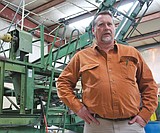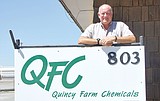Washington State Potato Commissioner Robert Halvorson, Jr. represents fresh growers
S. Evan Townsend<br> Special to Bbj | Hagadone News Network | UPDATED 11 years, 9 months AGO
"I get to play in the dirt," Washington State Potato Commissioner Robert Halvorson, Jr. says about his love of farming. "You can almost immediately see the results of your decisions. Almost immediately we know if we've done it right." Halvorson also enjoys being outside. "I do not do well in an office," he says smiling. "It's fun to be outside in the dirt growing stuff."
Halvorson has been a potato commissioner since 2000 representing District 2 which is the Yakima Valley area. His neighbor farmer was on the potato commission for 20 years and then Halvorson's father, Robert Halvorson, Sr., replaced him. The neighbor's son replaced the senior Halvorson, and then Halvorson replaced the son. Halvorson produces early fresh market potatoes and believes it's important to have "one voice on the commission for early fresh" growers. Halvorson was chairman last year and is on the research committee. "It's kept my learning curve going," he says.
Halvorson is 51 years old and has been married for 25 years to his wife, Christy. They have three children: Erik who is 20 and attending Yakima Valley Community College and a pair of 13-year-old twins, Lexi and Jax. Halvorson is a third generation farmer, his grandfather farming the land he now works west of Toppenish on the Yakima Indian Reservation. He thinks he started farming around age 11, digging ditches. Currently the farm comprises 1,500 acres growing wheat, corn, spearmint, peppermint and 160 acres of potatoes. Halvorson gets his water from the Wapato Irrigation Project which takes water from the Yakima River.
The Halvorson farm is unusual for its area. "Kind of the holy grail for the area is hops," Halvorson says. "We're kind of surrounded by hops."
Growing crops in the Yakima Valley is different from the Columbia Basin, Halvorson explains. "We actually have dirt here," he says with a grin, while the Basin has "sand." Because of the nature of the soil and the type of potatoes he grows, Halvorson still furrow irrigates. This makes them a bit dehydrated, he explains and that helps them survive harvest with less bruising. He says what can be dug up in two minutes in the Basin will take him one and a half hours. He has to have workers riding the two-row harvester in order to remove dirt clods that are the same size as the potatoes. And he only uses a two-row harvester because of those clods.
Halvorson doesn't use sprinklers because with the soil in the Yakima Valley you get a crust and that means more clods. Also, sprinkling will wash out the oils from mint. But, he says, as sprinkling technology improves he will "move toward" center pivots.
There is, however, an advantage he has over the Basin, Halvorson says. He grows colored potatoes and in the Yakima Valley they keep their color better because it doesn't get as hot as in the Basin. Because colored potatoes have a higher sugar content they don't store as well and so they are seasonal. They are, according to Halvorson, first dug in Florida, then in Bakersfield, California, then in the Yakima Valley. In the valley, red potatoes will retain color from July through Labor Day, Halvorson says. "Potatoes are in the store three to four days after they come up," Halvorson explains, adding they are packed the day they are harvested and don't sit in cold storage too long.
The biggest challenge Halvorson says he faces as a grower is "the ever-changing environment of government regulations. Seems like every week there's a new department in an agency to oversee what we do and we have to report to them." Halvorson thinks all the regulation is a result of ignorance about farming. "As the general public gets further and further away from generations that farmed, they have no idea what's going on." While the public seems to think farmers are somehow destroying the land, Halvorson points out that "Most guys out here farming plan to be here a long time and if you don't take care of the land you won't be here."
The Washington State Potato Commission does "everything right," according to Halvorson. "Our commission is the leader in the nation," he adds, saying he thinks part of that is because commissioners are still directly elected so they feel a responsibility to the growers they represent. He explains that the commission has an open industry planning event every five years, the last in 2011, and a "wide variety of growers" show up. This allows the commission to learn what the growers want and then the commissioners and staff "alter the direction of the commission accordingly."
"One of the biggest differences compared to other states is we strive to stay proactive rather than reactive," Halvorson explains. The commission, he says, tries to shape policy rather than react to it when it comes out. "When you're in a position of reacting you're always playing catch up." The commission staff, Halvorson says, works hard making contacts at the state and federal level and not just of legislators but of the staff at agencies that administer the rules. Those staff contacts are important, according to Halvorson, because while a congressman may get legislation passed that is good for agriculture, it's the agency that decides how to implement it. "The agency defines the rules and it doesn't always come up with something helpful," he adds.
Halvorson says his wife gets "pretty irritated sometimes" about the time commitment he has with the commission. He says she complains that March through November it's farming, December through February it's the commission. "I think the time commitment is more stressful for her then for me," Halvorson says.
The biggest change Halvorson says he's seen in the potato industry is the larger operations run by fewer growers. Halvorson has been involved with the Potato Commission since 1993 and he says there's now half the growers there were then. Also, he says, a big change has been the move to more specialized varieties which he adds has been good for his business. He says there are more 1-inch sized potatoes, especially the yellow ones, and "I think that's going to grow."
Halvorson says his spare time is spent on the potato commission or his kids, leaving him time for "nothing" else. Although he does "get humiliated at X-box" he explains with a grin. But at the moment he's busy with the spring craziness: "It's that time of year when everything's going to hit at once."
ARTICLES BY S. EVAN TOWNSEND<BR> SPECIAL TO BBJ

Washington State Potato Commissioner Robert Halvorson, Jr. represents fresh growers
"I get to play in the dirt," Washington State Potato Commissioner Robert Halvorson, Jr. says about his love of farming. "You can almost immediately see the results of your decisions. Almost immediately we know if we've done it right." Halvorson also enjoys being outside. "I do not do well in an office," he says smiling. "It's fun to be outside in the dirt growing stuff."

Washington State Potato Commissioner Frank Martinez 'Loves the Industry'
"I love the industry and I want to do everything I can to help it," Washington State Potato Commissioner Frank Martinez says about why he serves on the Potato Commission board. Martinez, who will be 63 years old next month, has been a commissioner for 12 years including time spent as chairman of the board and chairman of the Trade and Market Access Committee.

Good chemistry
Pete Romano is a tall man with a ready smile, friendly demeanor, and a firm handshake. The 64-year-old Business Unit Manager of Quincy Farm Chemicals has been working in agriculture nearly his entire life, almost all of that in the family business.

